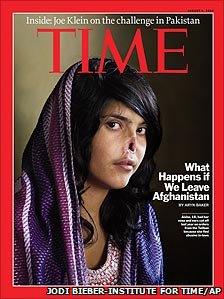Mutilated Afghan girl Aisha in US for new nose
- Published

The cover has generated much discussion in the US
The Afghan girl featured on a controversial Time magazine cover is in the US to have her nose rebuilt.
Aisha told Time her nose and ears had been cut off - with the approval of a Taliban commander - by her abusive husband as punishment for running away.
The front cover generated debate over the headline "What Happens if We Leave Afghanistan" and the use of the photo itself.
Her surgery is being done by the Grossman Burn Foundation in California.
The foundation campaigns on the issue of violence against women as well as doing free plastic surgery work.
Aisha, whose surname has not been revealed, will meet surgeon Peter Grossman next week to discuss the reconstruction of her nose.
The 18-year-old was reportedly given away by her family in childhood as a "blood debt" and was subsequently married to a Taliban fighter.
His family abused her and she ran away but was recaptured and mutilated by her husband.
Women for Afghan Women has been using Aisha's case to illustrate the fear of what will happen if US, British and other international forces leave prematurely. The Afghan-American group helps to run the shelter which took Aisha in.
But critics have questioned the tone of the Time cover.
One anti-war blogger, external wrote: "Isn't this title... applying emotional blackmail and exploiting gender politics to pitch for the status quo - a continued U.S. military involvement?"
Krista Riley, a contributor to a Muslim media blog, external, wrote: "This violence happened while the international forces were in Afghanistan, so the logic leading to the conclusion that things would necessarily be worse if 'we' left isn't exactly clear."
Richard Stengel, managing editor of Time, wrote a piece defending, external the use of the picture.
"Aisha posed for the picture and says she wants the world to see the effect a Taliban resurgence would have on the women of Afghanistan, many of whom have flourished in the past few years.
"She knows that she will become a symbol of the price Afghan women have had to pay for the repressive ideology of the Taliban."
Rebecca Grossman, from the foundation, told the BBC: "Her story is horrific. It is amazing living in this day and age that this is happening in parts of the world. Hopefully by sharing her story it will raise awareness."